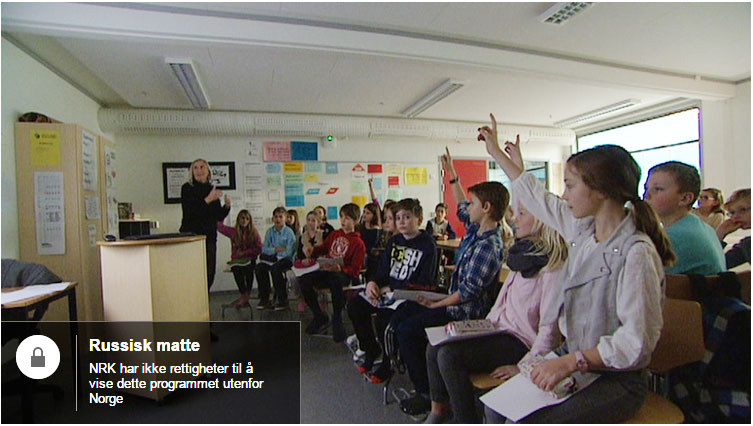Parents’ opinions on the method

Here nobody thinks that mathematics is hard.
(19.12.2013, NRK)
Parents’ feelings about the method
Kristin Jensen Alle:
“As a parent/parents to pupils who were at the forefront of the Russian mathematics program (now class 6B), and the follow-up work that has been done with subsequent classes (eg. the current class 4B), we have been thrilled to see the results our children have achieved – both in terms of mathematical knowledge and the working methods used during the program. The conscious deployment of these working methods in the Russian maths program gives the pupils valuable experience when it comes to effective learning strategies for other subjects, and will have an impact throughout the rest of their schooling. The focus on correct mathematical concepts from the very start, and the introduction and use of mathematical laws, has been good. This saves the pupils from having to redefine simplified concepts and terminology later. Our daughter says that the best thing about the program has been that the pupils have been able to learn a lot of different things, and that it’s been good never to have to work for too long at a time on the same topic. She also says that it has been a pleasure working on different topics in groups, getting to see different ways of reaching the same answer. We as parents are – as we have expressed throughout the project – very pleased with the approach to the subject, and the technical knowledge our children have acquired through the execution of the project. I hope that all pupils at Smeaheia school, all the schools in Sandnes, in Rogaland, and in Norway, get the same chance to acquire mathematical knowledge.â€
Anne Siri Sævereid and Joakim Haugen:
“It is with great pleasure that we as parents have been able to follow the alternative maths education given by Gerd Inger Moe based on “Russian†mathematics, for first to fifth year pupils at Smeaheia school. Our daughter has expressed her enthusiasm about constantly being faced with new challenges, and being encouraged to take part in the problem-solving process even when she couldn’t immediately see the answer. The focus has been more on reasoning than on the actual answers, something that has boosted the pupils’ self-confidence while also teaching them that there can be several correct solutions to a problem. This has been actively used in other subjects, which is extremely useful.
The pupils have also been challenged to work in different small groups where mathematical concepts are used to solve different problems. This has taught them to work together with other pupils, while also actively using mathematical concepts that make it easier to build on what they’ve learned.
It was with great enthusiasm that we read the results after the national standardised tests in the 5th year. This gave us “proof†that the program works for an average class, where it appears that all pupils are performing above the minimum required level, and the class as a whole is above the national average. The most important result has also been achieved – namely that both the weaker and stronger pupils have improved their
own results, and everyone has been given a good foundation to build upon in future. A winning formula for both weak and strong pupils!â€
Torhild Nystøl Berntsen:
“Our experience with “Russian mathematics teaching†has been entirely positive. The pupils faced greater challenges than they would normally meet during maths lessons, including the early introduction of mathematical concepts, and mastered them very well with the support of the teacher. The faster progression and more frequent repetition of different elements of mathematics has meant that the pupils are far ahead of the usual level for their age group. The way so much time has been spent during teaching on discussion and problem-solving in groups and pairs has made the teaching more varied, and improved the learning outcomes for the individual pupils. The pupils gained a greater sense of achievement, meaning that the technique also increased their motivation for the subject.â€
Marianne and Espen Gjerlaugsen:
“Both the children and we adults have been very impressed by “Russian mathematicsâ€. It was clear that the course material demanded a very different, faster progression than is typical for Norwegian maths textbooks, which paid off well for our children. They were introduced early to proper mathematical concepts, mathematical text passages, and calculating unknowns. The important focus was on the process itself: discussion in groups, making an effort even if one wasn’t entirely sure of the answer, and not least demonstrating that there can be different ways of reaching a solution. This has taught the children to “put themselves out there†and see that one can reason one’s way to an answer in different ways. We think that this has provided huge dividends not just in mathematics, but in the other subjects as well. We know that a lot of effort went into preparing material for the class, and the children thrived on the program. Going back to “Norwegian mathematics†was rather sad. A quote from the children: “It was great fun, and we miss keeping going with it!â€
